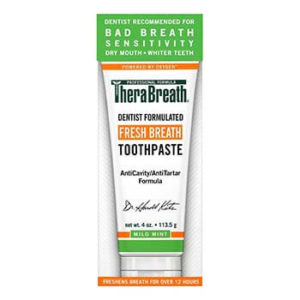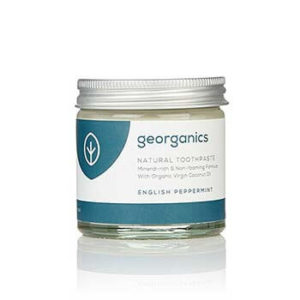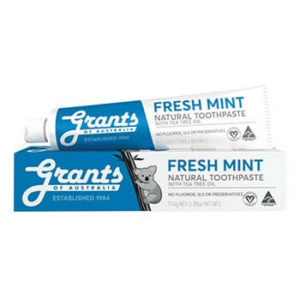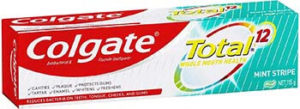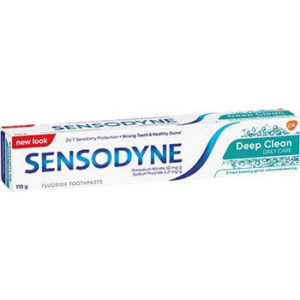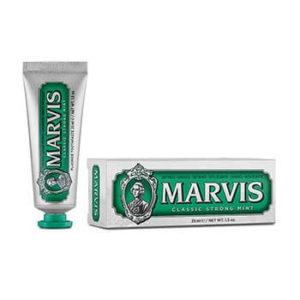No one likes to admit they have bad breath, but it is a common problem that can hit any one of us at any time. Often, a person with bad breath doesn’t even realise they have a problem as it is very difficult to detect it on themselves. We’ve put together some information about the best toothpaste for bad breath and tips on preventing the causes of bad breath so you can remain confident your breath stays fresh and odourless all day long.
Is there a special toothpaste for bad breath?
Some toothpaste specifically targets bad breath, but without knowing what the cause of your foul-smelling breath is, the product you choose may only mask the smell for a short period of time.
Halitosis is the medical term for bad breath. While it is often caused by the bacteria present in the mouth, there are some other causes of foul breath that may be related to medical or dental conditions and lifestyle factors, such as smoking. In these circumstances, even using the best toothpaste for bad breath will probably not be enough to mask mouth odour unless the underlying cause is treated. Let’s take a look at the causes of bad breath.
Causes of Bad Breath
Your mouth, tongue, and throat may be to blame because your oral microbiome – the collection of bacteria living on and in our bodies – plays a role in creating foul-smelling breath. Your oral microbiome is prone to changes that cause bad breath, such as:
Oral disease
Poor oral hygiene can lead to tooth decay and gum disease that can cause bad breath. Why? Because tooth decay and gum disease are a direct result of the damage caused by bacteria. Bacteria thrive on food debris in the mouth. As the bacteria break it down, acid is produced together with smelly volatile sulphur compounds (VSCs) that contribute to foul-smelling breath.
Medical Conditions
Certain health conditions, such as diabetes, and certain medications like anti-depressants, can cause halitosis. This is because side effects can affect saliva production, leading to dry mouth. Saliva is essential for washing away bacteria and without it, bacteria can build up, causing the breath to smell.
Lifestyle Habits
Although bad breath can signify serious health problems, it can also result from everyday lifestyle habits, such as smoking or consuming strong-smelling food, such as garlic. Food remnants that remain in the mouth can cause a bad odour because of bacterial growth, but pungent foods can affect breath as they travel through the body.
Smoking tobacco leaves a foul odour in the mouth and increases the likelihood of gum disease, which will also add to bad smelling breath.
How You Can Fight Halitosis?
For many people with bad breath, in the absence of any dental or medical condition or lifestyle choice, what may be surprising is that about 85% of cases come from inside their mouth. So, the top of your agenda should be to maintain a good oral hygiene routine with twice-daily brushing, flossing, and using various products, including fluoride toothpaste, floss, and mouthwashes to help remove the bacteria that cause bad breath. So, let’s take a look at some of these.
Best toothpaste for bad breath
Bacteria tend to accumulate in hard to reach places—such as the back of the tongue—and form a plaque bacteria film over the teeth and gums that can lead to volatile sulphur compounds (VSCs). While flossing and rinsing with mouthwashes should be part of your daily oral care routine, the most crucial factor in preventing bad breath is to brush your teeth.
With the vast array of toothpaste on the market, you may be wondering what to choose. Fluoride toothpaste is essential in protecting teeth and gums, but the type of toothpaste is not nearly as important as your brushing technique.
So, let’s look at the best toothpaste for bad breath.
TheraBreath toothpaste
TheraBreath Toothpaste guarantees to stop bad breath fast while battling the mouth bacteria that cause cavities. It works by using OXYD-8, a pH-balanced formula chemical that has been used in water purification for over a century. OXYD-8 generates oxygenating power that destroys bacteria as they cannot survive in an oxygen-rich environment. Therabreath is clinically tested and offers a 100% money-back guarantee, and is available as a non-fluoride and fluoride toothpaste.
Pros
- Targes breath and taste problems
- Neutralises bacterially produced VSC at the source
- Uses oxygen
- Alcohol-free
- Vegetarian, vegan, kosher
- Gluten-free
- Ideal for dry mouth sufferers, diabetics and canker sufferers
Cons
- Lingering aftertaste
- Ingredients are relatively mild, so may not be as potent as other products
Georganics
Georganics English Peppermint is a natural toothpaste flavoured with organic peppermint oil. Mineral-rich and with a strong, minty flavour, it works naturally to fight the harmful bacteria that can cause gum disease and lead to bad breath. Handcrafted in small batches, it comes in plastic-free packaging with a reusable glass jar.
Pros
- Organic
- Certified cruelty-free
- Certified vegan
- Sustainable packaging
Cons
- Texture and flavour may take a little getting used to
- Expensive
Grants Fresh Mint toothpaste
The Grants Fresh Mint toothpaste is a refreshing mint toothpaste that contains a combination of magnesium and calcium, as well as tea tree oil, which provides anti-bacterial and anti-inflammatory properties. This toothpaste has natural properties that help fight the bacteria that cause gingivitis and other oral health issues. It also helps to reduce inflammation and plaque. Available as a non-fluoride and fluoride toothpaste.
Pros
- Certified vegan
- Cruelty-free
- Fluoride-free
- GMO-free
- Gluten-free
- Manufactured under Good Manufacturing Practices (GMP)
- Made in Australia
- Inexpensive
Cons
- Quite foamy
- Taste is flavourless
Colgate Total Mint Stripe Toothpaste
Colgate Total Mint Stripe is a popular fluoride toothpaste and takes a comprehensive approach to oral care to help keep your mouth healthy. After 4 weeks of continuous use, it works to stop the growth of bacteria for up to 12 hours. What’s more, Colgate Total Stripe toothpaste helps relieve sensitivity to help prevent painful tooth cracks and cavities.
Pros
- Removes plaque
- Prevents cavities
- Protects enamel
- Freshens breath
- Prevents the build-up of tartar
- Protects gums
- Whitens teeth
Cons
- Lingering aftertaste
- No discernible whitening improvement
Sensodyne Toothpaste Sensitive Teeth Pain Deep Clean
Sensodyne has a full line of toothpaste, mouthwashes and products to help care for sensitive teeth and gums. Sensodyne Toothpaste Sensitive Teeth Pain Deep Clean contains fluoride, which is proven to strengthen teeth and prevent cavities but also contains ingredients that freshen breath and provide sensitivity relief.
Pros
- Deep cleans sensitive teeth
- Long-lasting sensitivity protection
- Freshens breath
- Maintains healthy gums
Cons
- Flavour isn’t as fresh as other brands
- Feels harsh on gums
Marvis Classic Strong Mint Toothpaste
Marvis toothpaste uses a patented processing method that ensures dense, compact texture, maximum protection and a bright smile that lasts. The flavours are long-lasting, pleasurable and designed to taste great. For over 50 years, Marvis has been the pioneer of dental hygiene products. The brand’s toothpaste and mouthwash have a distinctive, fresh, minty flavour guaranteed to make your mouth feel clean and fresh.
Pros
- Plaque and tartar control
- Long-lasting freshness
- Professional-feel cleaning
- Money-back guarantee if dissatisfied
- Whitening benefits
Cons
- More abrasive than other toothpaste
Other Products for Fresher Breath

- Products containing Xylitol, including lozenges or gum, can help to stimulate saliva and may be helpful if you suffer from a dry mouth.
- Tongue scrapers and tongue brushes can keep the back of the tongue free of the bacteria that can lead to bad breath.
- Mouthwashes can also help combat bad breath. However, many do not actively target plaque bacteria but just mask the smell they produce. So, make sure you choose one with active ingredients that destroy harmful oral bacteria to keep their population under control and automatically reduce VSCs that make the breath smell.
How to Avoid Bad Breath?
For many people, bad breath results from habits that can easily be modified to prevent the mouth from smelling, such as smoking and eating spicy foods. However, for others, it may not be so simple. This is when you should seek advice from a dentist who can check to see if there are any oral health problems that could be contributing to your bad breath or a doctor to rule out any medical issues.
While choosing the best toothpaste for bad breath can provide you with a fresher mouth and help to reduce the number of harmful bacteria that cause halitosis, you should always ensure that you have regular visits to a dentist to supplement your oral cleaning regime.
Do you suffer from bad breath?
Contact our experienced, friendly team here at Dental 266, your trusted dentist, by calling 02 9051 060. Visit our trusted dental clinic in Burwood for a check-up and teeth cleaning—even if you don’t have bad breath. Preventing plaque build-up can keep your breath fresh and is one less thing to worry about!
References
Mayo Clinic – Cavities/tooth decay
https://www.mayoclinic.org/diseases-conditions/cavities/symptoms-causes/syc-20352892
Oral Health Foundation – Gum disease
https://www.dentalhealth.org/gum-disease
European Journal of Dentistry – Halitosis: Current concepts on etiology, diagnosis and management
https://www.ncbi.nlm.nih.gov/pmc/articles/PMC4813452/
Colgate – How long should I brush?
https://www.colgate.com/en-us/oral-health/brushing-and-flossing/3-tooth-brushing-techniques-that-get-the-job-done


